“情态动词+have done”归纳
“情态动词+have done”归纳
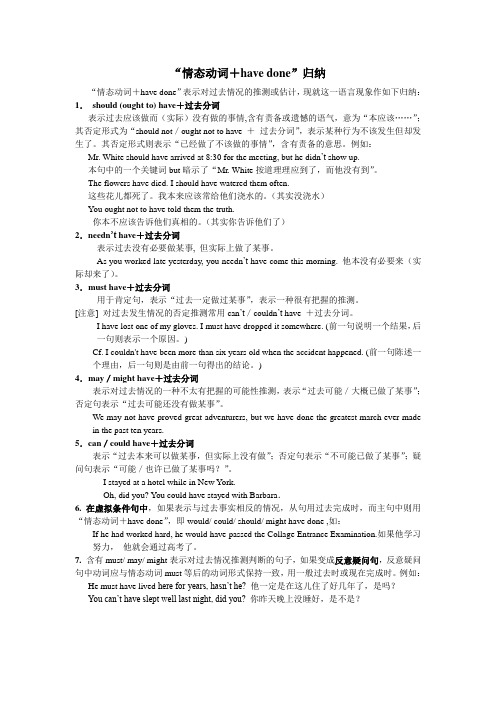
“情态动词+have done”归纳“情态动词+have done”表示对过去情况的推测或估计,现就这一语言现象作如下归纳:1.should (ought to) have+过去分词表示过去应该做而(实际)没有做的事情,含有责备或遗憾的语气,意为“本应该……”;其否定形式为“should not/ought not to have +过去分词”,表示某种行为不该发生但却发生了。
其否定形式则表示“已经做了不该做的事情”,含有责备的意思。
例如:Mr. White should have arrived at 8:30 for the meeting, but he didn’t show up.本句中的一个关键词but暗示了“Mr. White按道理理应到了,而他没有到”。
The flowers have died. I should have watered them often.这些花儿都死了。
我本来应该常给他们浇水的。
(其实没浇水)You ought not to have told them the truth.你本不应该告诉他们真相的。
(其实你告诉他们了)2.needn’t have+过去分词表示过去没有必要做某事, 但实际上做了某事。
As you worked late yesterday, you needn’t have come this morning. 他本没有必要来(实际却来了)。
3.must have+过去分词用于肯定句,表示“过去一定做过某事”,表示一种很有把握的推测。
[注意] 对过去发生情况的否定推测常用can’t/couldn’t have +过去分词。
I have lost one of my gloves. I must have dropped it somewhere. (前一句说明一个结果,后一句则表示一个原因。
)Cf. I couldn't have been more than six years old when the accident happened. (前一句陈述一个理由,后一句则是由前一句得出的结论。
情态动词+have done

情态动词情态动词的推测语气由强到弱顺序:must —will —would —should —ought to —can —could —may —might“情态动词十have done”的用法1、can have donecan have done用于对过去动作的推测,表示“可能”,常用于否定句和疑问句。
She can't have gone to work. It's Sunday.她不可能去上班,今天是星期日。
She is two hours late. What can have happened?她已经晚了两个小时,可能会发生什么事情呢?-Do you think our basketballers played very well yesterday? 你认为我们的篮球队员打得好吗?- They couldn’t have done better. 他们从来没有打这么好过。
2、must have donemust have done用于对过去动作的推测,表示"可能一定……",用于肯定的陈述句中。
I have not seen him for quite a long time. He must have been very busy.我很久没见他了,他一定很忙。
I didn't hear the phone, I must have been asleep. 我没听到电话,我肯定是睡着了。
3、may have donemay have done用于对过去动作的推测,表示"或许;可能",多用于肯定句和否定句。
She is late. She may have missed the bus.她迟到了,她可能没赶上车。
He may not have read the book.他也许没有看过那本书。
He might have given you more help, even though he was very busy.即使他很忙,他可能会给你很多帮助。
情态动词have_done

情态动词+have+done是历年高考的重点和难点之一,现将其用法总结归纳如下:一、must+have+done表示对过去事情的肯定推测,译成“一定做过某事”,该结构只用于肯定句.1. It must have rained last night, for the ground is wet. 昨晚一定下雨了,因为地面还是湿的2. You must have been mad to speak to the servant.你和仆人说话,一定是发疯了二、“can't+have+done”表示对过去事情的否定推测,译成“不可能做过某事”。
1. Mr. Smith can't have gone to Beijing, for I saw him in the library just now. 史密斯先生不可能去北京了,我刚才还在图书馆见过他。
2.Mary can't have stolen your money. She has gone home.玛丽不可能偷你的钱,她回家去了三、“can+have+done”表示对过去行为的怀疑,用于疑问句,译成“可能做过……吗?”。
1.There is no light in the room. Can they have gone out?屋里没有灯,他们可能出去了吗?2. There is nowhere to find them. Where can they have gone? 到处找不到他们,他们可能到什么地方去呢?四、could+have+done’是虚拟语气,表示对过去事情的假设,意思是本来能够做某事而没有做.He could have passed the exam, but he was too careless.本来他能通过考试,但他太粗心五、“may+have+done”表示对发生过的事情的推测,意思是“可能已经”或“也许已经”,用于肯定句中。
情态动词加have done的用法
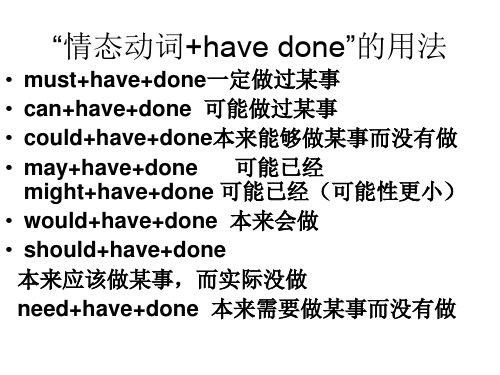
四、 “may+have+done”
• 表示对发生过的事情的推测,意思是“可 能已经”或“也许已经”,用于肯定句中。 • • • • —What has happened to George? —I don't know. He may have got lost. —乔治发生了什么事? ——我不知道,他可能迷路了。
一、 “must+have+done”
• 表示对过去事情的肯定推测,译成“一定 做过某事”,该结构只用于肯定句。 • 1. It must have rained last night, for the ground is wet. 昨晚一定下雨了,因为地面 还是湿的。
2. You must have been mad to speak to the servant. 你和仆人说话,一定是发疯了。
八、 “should+have+done”
• 意思是“本来应该做某事,而实际没做。” “shouldn‘t+have+done”表示本来不应该做某 事,而实际做了。含有指责对方或自责的含意。 • • 1. Tom, you are too lazy. The work should have been finished yesterday. 汤姆,你太懒惰了,这 项工作本来应该昨天就做完的。 • 2. Look, Tom is crying. I shouldn't have been so harsh on him. 看,汤姆哭了,我本来不应该对他 如此严厉。
九、 “ought to+have+done”
• 表示过去应该做而实际并没有做,译成 “理应做……”,往往表示遗憾。与 “should+have+done”用法基本一样。
情态动词完成时态的用法
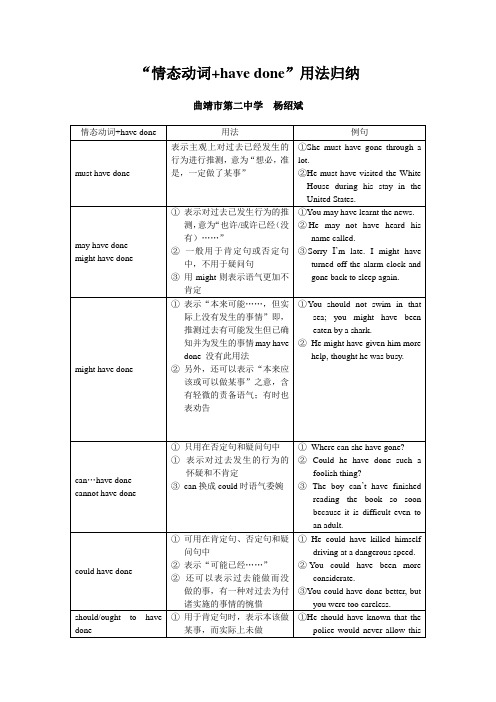
用于事后的建议,含轻微责备的口吻,意为“当时最好做了某事”,其否定式had better not have done表示相反的含义
①You had better have started earlier.
②You had better not havescoldedher.
can…have done
cannot have done
①只用在否定句和疑问句中
1表示对过去发生的行为的怀疑பைடு நூலகம்不肯定
③can换成could时语气委婉
①Where can she have gone?
②Could he have done such a foolish thing?
③The boy can’t have finished reading the book so soon because it is difficult even to an adult.
may have done
might have done
①表示对过去已发生行为的推测,意为“也许/或许已经(没有)……”
②一般用于肯定句或否定句中,不用于疑问句
③用might则表示语气更加不肯定
①You may have learnt the news.
②He may not have heard his name called.
②另外,还可以表示“本来应该或可以做某事”之意,含有轻微的责备语气;有时也表劝告
①You should notswimin that sea; you might have been eaten by a shark.
②He might have given him more help, thought he was busy.
情态动词+have done的构成及用法含译文
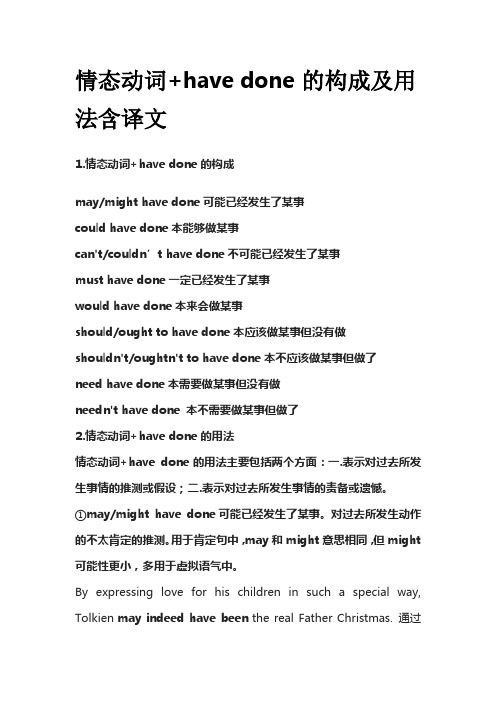
情态动词+have done的构成及用法含译文1.情态动词+have done的构成may/might have done可能已经发生了某事could have done本能够做某事can't/couldn’t have done不可能已经发生了某事must have done一定已经发生了某事would have done本来会做某事should/ought to have done本应该做某事但没有做shouldn't/oughtn't to have done本不应该做某事但做了need have done本需要做某事但没有做needn't have done 本不需要做某事但做了2.情态动词+have done的用法情态动词+have done的用法主要包括两个方面:一.表示对过去所发生事情的推测或假设;二.表示对过去所发生事情的责备或遗憾。
①may/might have done可能已经发生了某事。
对过去所发生动作的不太肯定的推测。
用于肯定句中,may和might意思相同,但might 可能性更小,多用于虚拟语气中。
By expressing love for his children in such a special way, Tolkien may indeed have been the real Father Christmas. 通过这种特别的方式表达对孩子们的爱,托尔金可能真的是真正的圣诞老人。
(新外研版必修二)You can check his office. He might have been there already. 你可以去他的办公室看看。
他可能已经到那儿了。
If he had been given more encouragement, he might have made greater progress. 如果给他更多的鼓励,他可能会取得更大的进步。
“情态动词+have done”用法归纳

难点剖析
3 7
“ 态 动 词 +hv oe’ 法 归 纳 情 aed n ’ 用
■ 洪 克 霞
“ 情态动词 + hv oe 既 可 以用来 表示对 过 aedn ” 去所发生事情的一种推测 , 可以用来表 达其他 含 也 义 。它的用 法是情 态动词语 法 中的一个难 点 , 频 又 受历年高考题 的青 睐。下面 笔 者将 其用 法 做一 归
二 、 81 a e d n C. h v o e 1 "
Wh r smy dcin r ?Irme b rIp t t e e e ei i o a y e m e u r t ih y sed y. e tra Yo u i i ew o g p a e = nt rn lc . f h A. s p t mu t u B. h ud h v u s ol aep t C. g tp t mi u h D. ih a e p t m v t v u , h
— —
G esw a !Ihv o frm em ae . u s h t a egt o ytr pp r A G et Yo ra! u Ta i lad u l edwd y n t o o e p a tf
— —
y a s・ er
A. e d ' n e nt C.h ud ’ s o lnt
五 、 ih a e d n m g t v o e h
解析 : 答案为 c 。从对话上来看 , 此处应该是对 过去动作的推测 , A和 B是对现在或将来的推测 , 应 排除 ; D指过去本应该做而未做 的事 , 而 语境不符 。
S elo sv r a p . h h k eyh p y S e o h v as a a e p se te e a . h x m I u s O I sn tdf c l a e l. e sS .t o i i t f ra g ’ u t 1 A. h ud s o l B. o l c ud C. s mu t D. g t mi h
情态动词+have done用法讲解
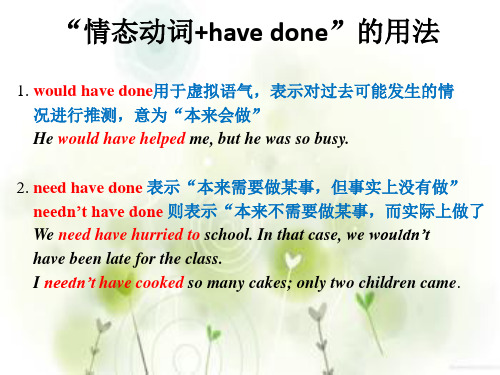
1. would have done用于虚拟语气,表示对过去可能发生的情 况进行推测,意为“本来会做” He would have helped me, but he was so busy. 2. need have done 表示“本来需要做某事,但事实上没有做” needn’t have done 则表示“本来不需要做某事,而实际上做了 We need have hurried to school. In that case, we wouldn’t have been late for the class. I needn’t have cooked so many cakes; only two children came.
3. should have done 表示“本来应该做某事,二十几上没有做” shouldn’t have done 则表示“本来不应该做某事,而实际上做 了”,含有职责对法或自责之意。 The essay should have been finished last week, but I forgot it. Tom is crying ; I shouldn’t have been so harsh on him. 4. might have done 表示使对过去情况把握性不大的推测,意为 “可能坐过…”或表示说话人因某人没做某事而不满,意为 “本应该做…” He might have won the race, if you had been backing him. 5. must have done 表示对过去情况的肯定推测,意为“一定做过 某事”,该结构只用于肯定句 It must have rained last night, for the ground is wet.
- 1、下载文档前请自行甄别文档内容的完整性,平台不提供额外的编辑、内容补充、找答案等附加服务。
- 2、"仅部分预览"的文档,不可在线预览部分如存在完整性等问题,可反馈申请退款(可完整预览的文档不适用该条件!)。
- 3、如文档侵犯您的权益,请联系客服反馈,我们会尽快为您处理(人工客服工作时间:9:00-18:30)。
“情态动词+have done”归纳
“情态动词+have done”表示对过去情况的推测或估计,现就这一语言现象作如下归纳:1.should (ought to) have+过去分词
表示过去应该做而(实际)没有做的事情,含有责备或遗憾的语气,意为“本应该……”;其否定形式为“should not/ought not to have +过去分词”,表示某种行为不该发生但却发生了。
其否定形式则表示“已经做了不该做的事情”,含有责备的意思。
例如:Mr. White should have arrived at 8:30 for the meeting, but he didn’t show up.
本句中的一个关键词but暗示了“Mr. White按道理理应到了,而他没有到”。
The flowers have died. I should have watered them often.
这些花儿都死了。
我本来应该常给他们浇水的。
(其实没浇水)
You ought not to have told them the truth.
你本不应该告诉他们真相的。
(其实你告诉他们了)
2.needn’t have+过去分词
表示过去没有必要做某事, 但实际上做了某事。
As you worked late yesterday, you needn’t have come this morning. 他本没有必要来(实际却来了)。
3.must have+过去分词
用于肯定句,表示“过去一定做过某事”,表示一种很有把握的推测。
[注意] 对过去发生情况的否定推测常用can’t/couldn’t have +过去分词。
I have lost one of my gloves. I must have dropped it somewhere. (前一句说明一个结果,后
一句则表示一个原因。
)
Cf. I couldn't have been more than six years old when the accident happened. (前一句陈述一个理由,后一句则是由前一句得出的结论。
)
4.may/might have+过去分词
表示对过去情况的一种不太有把握的可能性推测,表示“过去可能/大概已做了某事”;否定句表示“过去可能还没有做某事”。
We may not have proved great adventurers, but we have done the greatest march ever made in the past ten years.
5.can/could have+过去分词
表示“过去本来可以做某事,但实际上没有做”;否定句表示“不可能已做了某事”;疑问句表示“可能/也许已做了某事吗?”。
--- I stayed at a hotel while in New York.
--- Oh, did you? You could have stayed with Barbara.
6. 在虚拟条件句中,如果表示与过去事实相反的情况,从句用过去完成时,而主句中则用“情态动词+have done”,即would/ could/ should/ might have done ,如:
If he had worked hard, he would have passed the Collage Entrance Examination.如果他学习努力,他就会通过高考了。
7.含有must/ may/ might表示对过去情况推测判断的句子,如果变成反意疑问句,反意疑问句中动词应与情态动词must等后的动词形式保持一致,用一般过去时或现在完成时。
例如:He must have lived here for years, hasn’t he?他一定是在这儿住了好几年了,是吗?
You can’t have slept well last night, did you?你昨天晚上没睡好,是不是?。
